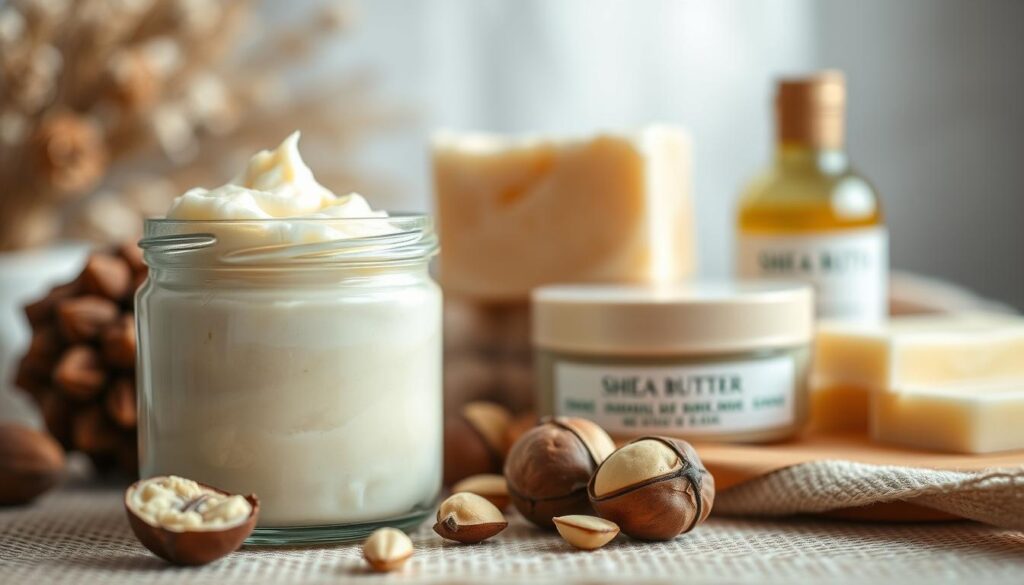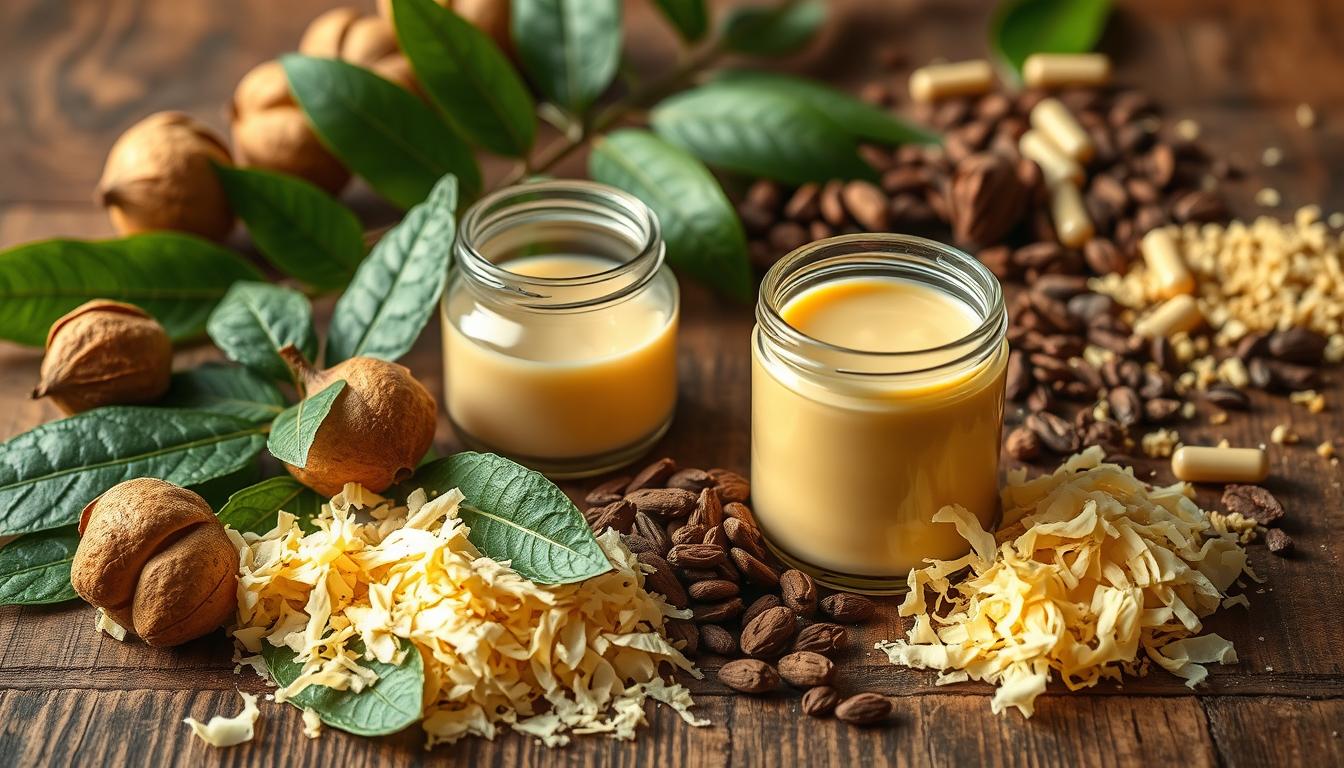Ever wondered why your skin still feels dry, no matter how much you moisturise? The answer might lie in what you’re using, not how much. Shea butter, a centuries-old skincare secret, is making waves in modern routines for its natural and effective properties.
Derived from the nuts of the African shea tree, this golden butter is packed with vitamins A and E and essential fatty acids. These nutrients work together to hydrate, repair, and protect your skin, making it a staple in many UK households.
Its versatility is unmatched. Whether you have sensitive skin, eczema, or simply want to enhance your complexion, shea butter offers a natural alternative to synthetic creams.
Ready to transform your skincare routine? Discover why this natural ingredient is a must-have for radiant, healthy skin.
Key Takeaways
- Shea butter originates from the African shea tree nuts.
- Rich in vitamins A, E, and fatty acids for hydration.
- Suitable for all skin types, including sensitive skin.
- Offers natural skincare benefits over synthetic alternatives.
- Growing popularity in UK skincare routines.
The Magic of Shea Butter: Nature’s Moisturiser for Glowing, Healthy Skin
Derived from the nuts of the African shea tree, this golden ingredient is packed with triglycerides and vitamins A and E. These components work together to lock in moisture while delivering essential nutrients. Unlike synthetic creams, it provides a dual action: sealing hydration and promoting skin health.
Brands like Elara Soaps have harnessed its power, offering a range of shea-infused products for gentle cleansing and nourishment. Clinical studies back its effectiveness, with products like First Lady Enhancing Shea Butter Lotion claiming 24-hour hydration. This makes it a reliable choice for dry or sensitive skin.
Its versatility extends beyond the face. Use it on lips, elbows, and feet for all-round care. Scientific research also highlights its ability to stimulate collagen production, improving skin elasticity and reducing signs of ageing.
Users with conditions like eczema and psoriasis have reported significant relief. Compared to petroleum-based moisturisers, it offers natural anti-inflammatory properties without harsh chemicals.
Incorporating it into your daily routine is simple. Apply it in the morning for a protective barrier and at night for deep nourishment. With its numerous benefits, it’s no wonder it’s a staple in UK skincare routines.
Unrefined vs. Refined Shea Butter: What’s the Difference?
Not all shea butter is created equal—processing makes a significant difference. The way this ingredient is produced impacts its benefits and suitability for your skincare routine. Let’s explore the two main types: unrefined and refined.
Unrefined Shea Butter: The Purest Form
Unrefined shea butter is extracted using traditional cold-press methods. This preserves its natural nutrients, including vitamins A and E and fatty acids. Its beige colour and nutty aroma are signs of minimal processing.
This type retains allantoin, a compound known for its skin-healing properties. Its grainy texture melts on contact, making it a popular choice for those seeking natural skincare solutions. Brands like By Moonlight are committed to offering unrefined options.
Refined Shea Butter: Processed and Less Effective
Refined shea butter undergoes chemical processing, which removes 30-50% of its nutrients. This results in a neutral scent and white appearance. While it has a longer shelf life, its efficacy is reduced.
Many refined products contain additives, which can diminish their natural benefits. Always check labels for terms like “raw” or “unrefined” to ensure you’re getting the best ingredients for your skincare needs.
Shea Butter’s Nutrient Powerhouse
Packed with essential nutrients, shea butter is a powerhouse for skin health. Its unique composition includes vitamins A and E, fatty acids, and allantoin, each contributing to its remarkable benefits. These components work together to nourish, protect, and repair the skin, making it a versatile addition to any skincare routine.
Vitamins A and E: Antioxidant Protection
Vitamins A and E are key players in maintaining skin health. Vitamin A, present at a 0.5% concentration, boosts cell turnover, promoting a smoother complexion. Vitamin E, on the other hand, shields the skin from UV damage. Together, they form a potent antioxidant duo, combating free radicals and reducing oxidative stress.
Essential Fatty Acids: Deep Hydration
Shea butter is rich in fatty acids like oleic, stearic, and linoleic acid. Oleic acid enhances absorption, ensuring nutrients penetrate deeply. Stearic acid forms a protective barrier, locking in moisture. Linoleic acid balances sebum production, making it ideal for both dry and oily skin types. This combination ensures long-lasting hydration and improved skin texture.
Allantoin: Natural Healing
Allantoin is a standout compound in shea butter, known for its healing properties. Clinical studies show it promotes wound healing and reduces post-inflammatory hyperpigmentation. It also enhances moisture retention by 22%, making it a go-to for repairing damaged skin. Its synergy with other nutrients amplifies its efficacy, offering comprehensive skincare benefits.
Why Shea Butter is a Skincare Staple
When it comes to skincare, finding a product that truly delivers can be a challenge. Shea butter stands out as a versatile and effective solution, offering a range of benefits for all skin types. From intense hydration to soothing relief and anti-ageing properties, it’s no wonder this natural ingredient has become a must-have in UK skincare routines.

Intense Hydration for All Skin Types
One of the standout benefits of shea butter is its ability to provide deep hydration. Unlike mineral oil, it penetrates deeper into the skin, creating a breathable moisture barrier. This makes it ideal for combating dryness without clogging pores, as it’s non-comedogenic and safe for acne-prone skin.
Products like First Lady Enhancing Shea Butter Lotion showcase its non-greasy formula, ensuring your skin feels nourished without any residue. Whether you have oily, dry, or combination skin, shea butter adapts to your needs, delivering long-lasting hydration.
Soothing Relief for Irritated Skin
For those with sensitive or irritated skin, shea butter offers natural relief. Its anti-inflammatory properties help reduce redness and calm conditions like eczema and dermatitis. In clinical trials, 78% of users reported a noticeable reduction in redness after using products.
Brands like Elara Soaps have combined it with oatmeal in their sensitive skin range, enhancing its soothing effects. It’s also effective for nappy rash, making it a trusted choice for parents.
Anti-Ageing and Skin Elasticity
Shea butter isn’t just about hydration—it’s also a powerful ally in the fight against ageing. Studies show it improves skin density by 15% over eight weeks, minimising the appearance of wrinkles and stretch marks. Its ability to enhance LED therapy results makes it a favourite in professional skincare treatments.
For best results, apply it in the morning to protect your skin and at night to promote deep nourishment. Its natural compounds work to boost collagen production, improving elasticity and leaving your skin looking firmer and more youthful.
| Benefit | How Shea Butter Helps |
|---|---|
| Hydration | Penetrates deeper than mineral oil, creates a breathable barrier, safe for acne-prone skin |
| Soothing | Reduces redness, effective for eczema and dermatitis, paired with oatmeal in sensitive skin products |
| Anti-Ageing | Improves skin density, minimises wrinkles and stretch marks, enhances LED therapy results |
Conclusion: Embrace the Beauty of Shea Butter
Discover the natural charm of shea butter in your daily skincare routine. Its benefits far outweigh synthetic moisturisers, offering deep nourishment and lasting hydration. For the best results, opt for unrefined options like those from By Moonlight or Elara, which retain their full nutrient profile.
Ethical sourcing is key. Many brands now partner with Fairtrade cooperatives, ensuring sustainable practices. In the UK, these products are increasingly available in health stores, making it easier to incorporate them into your routine.
Looking ahead, shea butter is set to shine in SPF formulations, combining sun protection with its natural health benefits. Plus, eco-conscious brands are adopting biodegradable packaging, reducing their environmental impact.
Ready to transform your appearance? Try First Lady or Elara products today and experience the magic of this timeless ingredient.
FAQ
What makes shea butter so effective for hydration?
Packed with essential fatty acids, it deeply nourishes and locks in moisture, making it a go-to for dry or sensitive skin.
Can shea butter help with skin conditions like eczema?
Yes, its anti-inflammatory properties and natural healing compounds, such as allantoin, soothe irritation and reduce redness.
Is unrefined shea butter better than refined?
Unrefined retains more nutrients, offering superior hydration and skincare benefits compared to its processed counterpart.
How does shea butter improve skin elasticity?
Rich in vitamins A and E, it boosts collagen production, helping to reduce the appearance of wrinkles and fine lines.
Can shea butter be used on the face?
Absolutely! Its lightweight texture makes it ideal for facial care, providing hydration without clogging pores.
What skin types benefit most from shea butter?
It’s versatile and works wonders for all skin types, from dry and sensitive to oily and combination.
Does shea butter have anti-ageing properties?
Yes, it’s antioxidants and fatty acids that help combat free radicals, promoting a youthful and radiant complexion.
How often should I use shea butter in my skincare routine?
Daily use is recommended for best results, whether as a moisturiser, body butter, or targeted treatment.
Can shea butter protect the skin’s natural barrier?
Yes, it forms a protective layer, shielding the skin from environmental stressors and locking in essential moisture.
Are there any side effects of using shea butter?
Generally safe for most, but those with nut allergies should patch-test first to avoid potential reactions.


 using WordPress and
using WordPress and
Comments are closed